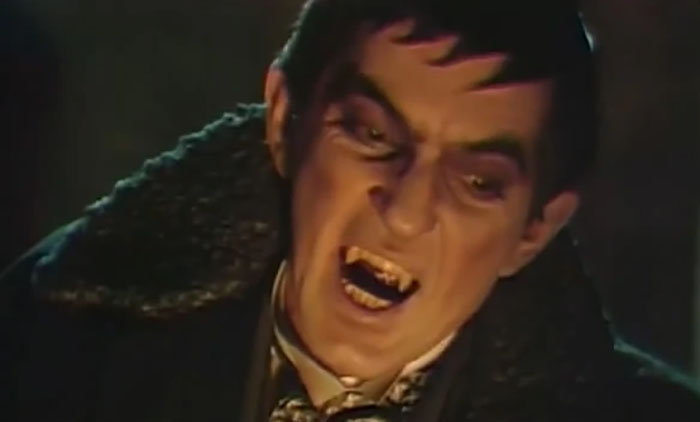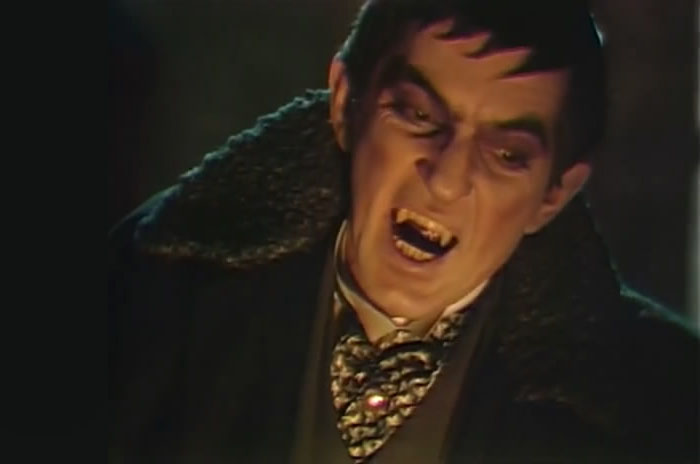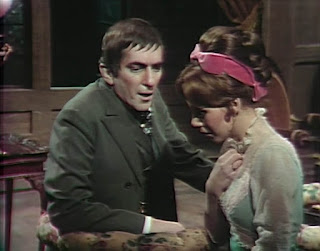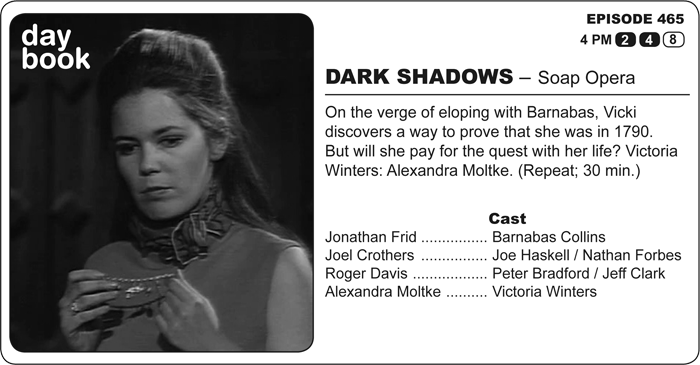By PATRICK McCRAY
Taped on this day in 1969: Episode 727
When Trask takes advantage of the Collinses generosity, will Barnabas take advantage of his Charity? Charity Trask: Nancy Barrett. (Repeat. 30 min.)
Quentin, revived, is distressed to find no one in the tower room. He and Barnabas dislike Trask, who’s now staying at Collinwood, but Quentin mistrusts his cousin from England more. Later, Trask’s daughter arrives and knows Rachel. The latter later reveals to Barnabas that she was once forced to work for Trask, who abused her when she was younger. Barnabas retaliates by biting the younger Trask.
There’s a great moment in this episode early on. Trask is in the drawing room, praying to, literally, the high heavens, full-force, and Barnabas walks into the foyer from outside. He hears the religious ecstasy roiling within the drawing room. He knows who it is. And he knows what all of that implies. At no point has anyone in history said, “Oh, good, a Trask is here; our troubles are over.”
You know as if his mission weren’t difficult enough. It was just a year or so ago, kind of, that he was having to wall a Trask up. That should have fixed it. How could an ostensibly celibate guy have such a legacy, and seemingly do so from behind a wall of bricks? Yes, he could have had his kids beforehand, but it’s not as interesting to contemplate.
I don’t know what it is about a really forcefully uttered prayer by a guy in a long black coat and muttonchops, but it is a portent of doom like few others. Jonathan Frid captures the only rational response. It’s not so broad as to ruin the day of theology enthusiasts, but it definitely lets us know that he’s not hearing a blissfully gentle cover of “Moon River,” either. And Barnabas’ expression subtly conveys the rarest quintessence of an understated, “Oh, shit,” that simply commands that I use the word, for none other suffices. Of course, like any irresponsible critic, I read into these things what I want to, and in this case, as he’s processing bellicose and Biblical booming from beyond the door, I wonder if Barnabas is asking himself, “Should I hang up my coat, stroll in, and engage in thoughtful banter, redolent of implicated knowledge and planned counter-strikes, or should I simply hoist my cane aloft and beat the bullying bastard into 1898 before he can screw up the storyline any more?”
Banter wins.
Later, Quentin enters, strangely compliant to Trask until he’s alone with Barnabas. In that scene, we see Quentin’s strength and the weakness Barnabas must overcome. For a moment, we see them collaborate against a common enemy. Quentin, however, assuming everyone is as opportunistic as he is, turns his suspicions with wearying inevitability toward Barnabas, cuing our hero to again show the patience of one of the saints embarrassed by Trask’s allegiance. It’s frustrating, but it illustrates the size of the challenge confronting Barnabas and again outlines the overall arc of Quentin’s story, indicating that it’s only the beginning. In structure and complexity, it is an arc that may very well be the show’s greatest, narrative triumph, necessitating nine or so months to tell.
Mechanically, Barnabas and Quentin have very different story arcs, not only in particulars, but in the gears of the storytelling, itself. Clearly, Barnabas has the longer story in number of episodes. But he also has a longer arc in terms of sweep and span of life. Barnabas’ story is not about what his origin does to transform him, it’s about what it leads him to do with his life. Quentin’s story is shorter, especially in that everything interesting possible is knit up in his origin and immediate aftermath. No wonder Quentin seemed wasted after 1897; what else could they do with him? His story is about going from boyhood to manhood. Barnabas’ story is about going from being a man to, ironically, a god. A master of time, space, and the very plasma of life. He would sometimes reject his godhood. Sometimes embrace it. Quentin can never use his condition to any advantage. Barnabas’ true curse was that he could.
Beyond that, the episode putters along perfunctorily. It’s another episode in Trask Recruits, this time letting us know that Rachel was his prisoner and that his daughter loves the power to say ‘no,’ as much as he does. Well, Barnabas has other plans.
Unable to crush him immediately, and suspended by Rachel’s fright, Barnabas lets it go. Well, other eras of Barnabas would let it go. But the 1897 Barnabas is Silver Age to the point that I’m amazed Willie Loomis didn’t become a talking dog sidekick. Which would have been great. Like, you know a spaniel? I digress. THIS Barnabas might not punch Trask’s lights out, but he can at least bite his daughter and hold her in his sway as spy and saboteur. Besides, biting and controlling Nancy Barret is a legitimate part of the cyclical story that the show is developing.
The only dependable Trask I know. Hallelujah!





